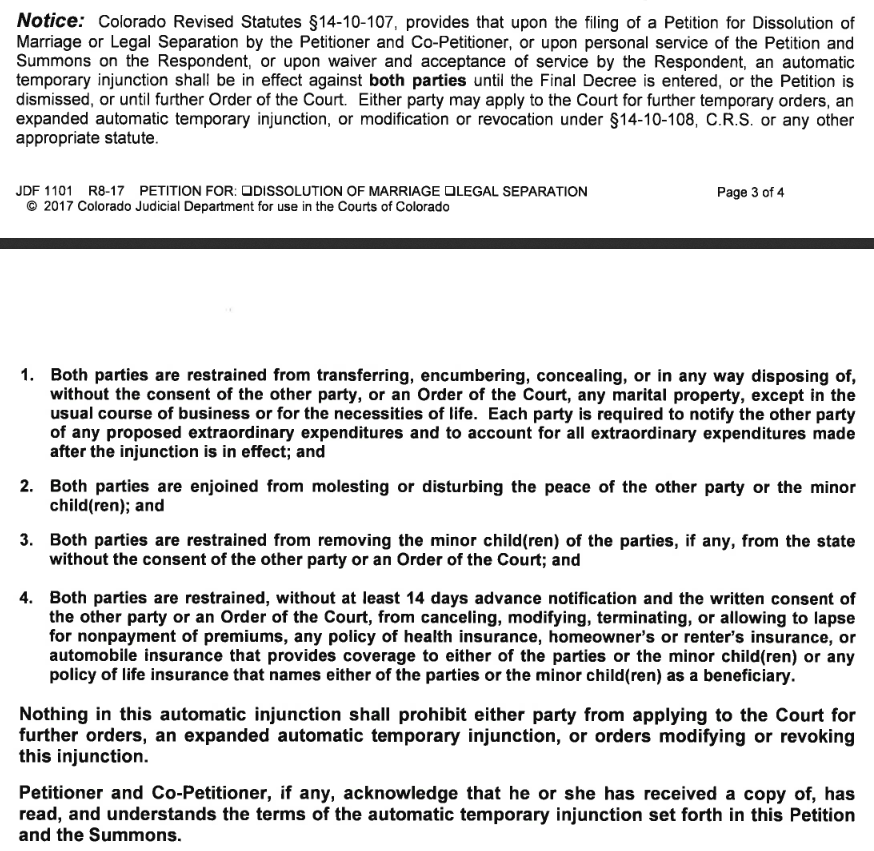When you file a divorce in Colorado, the court issues an Automatic Temporary Injunction. Under Colorado Revised Statute § 14-10-107(b)(I), when a petitioner and co-petitioner file for divorce, or when a respondent gets served with the divorce filing, the Automatic Injunction goes into effect. Colorado Revised Statute § 14-10-107(b)(I) lays out the language of the Automatic Injunction as follows:
(A) Restraining both parties from transferring, encumbering, concealing, or in any way disposing of, without the consent of the other party or an order of the court, any marital property, except in the usual course of business or for the necessities of life and requiring each party to notify the other party of any proposed extraordinary expenditures and to account to the court for all extraordinary expenditures made after the injunction is in effect; (B) Enjoining both parties from molesting or disturbing the peace of the other party; (C) Restraining both parties from removing the minor child or children of the parties, if any, from the state without the consent of the other party or an order of the court; and (D) Restraining both parties, without at least fourteen days’ advance notification and the written consent of the other party or an order of the court, from canceling, modifying, terminating, or allowing to lapse for nonpayment of premiums, any policy of health insurance, homeowner’s or renter’s insurance, or automobile insurance that provides coverage to either of the parties or the minor children or any policy of life insurance that names either of the parties or the minor children as a beneficiary.
This language is printed directly on the standard divorce filing form.
What does all this legalese mean?
Some of the terms of the Automatic Injunction are relatively straightforward. For example, the third provision prevents you and your spouse from leaving the state with any minor children without permission. The fourth provision is longer but says that neither spouse can cancel or modify health, homeowner’s, renter’s, automobile, or life insurance.
The first provision, however, poses a lot of issues. On its face, this provision seeks to maintain the status quo and stop spouses from tampering with marital property. It is intended to prevent an angry, emotional spouse from retaliating against the other, or exerting financial control. It stops spouses from emptying the joint bank account and hiding assets.
But, outside of that obviously troublesome behavior, what does the Automatic Injunction stop you and your spouse from doing? Can you take out an SBA loan? Can you cancel a credit card? What about modifying your will?
The limits of the Automatic Injunction
Colorado’s courts provide some guidance about what is and what is not okay to do. However, there is still a lot of ambiguity. Before acting, you should consult with a divorce attorney.
First, it is important to recognize that the Automatic Injunction only applies to marital property. This means you can arguably do whatever you would like with your separate property. However, there may be an issue with an increase in the value of separate property, which is marital. If you have a question about whether property is separate or marital, contact an attorney.
Changing a Payable on Death “POD” Beneficiary
From the plain language of the statute, the Injunction does not appear to apply to changes in POD beneficiaries. In In re Estate of Westfall, the Colorado Court of Appeals dealt with this exact issue. The court held that changing a POD beneficiary does not encumber marital property. Because changing a POD beneficiary has no impact on marital property unless the spouse dies, it does not affect what is subject to division. Basically, the POD beneficiary has no impact on the property unless the spouse dies, so it is not transferring or encumbering the property.
Changing a Will
Similarly, nothing in the Injunction appears to prevent a spouse from changing his or her will. Using the rationale from In re Estate of Westfall and another case, Gorman-English v. Estate of English, changes to a will may not actually impact marital property. This makes sense because changing a beneficiary in a will does not actually affect the marital property unless a spouse dies. In fact, some estate attorneys actually recommend changing a will during a divorce.
Changing or Canceling a Credit Card
The Automatic Injunction is also silent about credit cards. There is not much guidance from Colorado courts about the limits of changing credit cards during a divorce. An important thing to remember is the injunction prevents encumbering marital property. If you and your spouse share a credit card, canceling that card or removing your spouse may be seen as encumbering marital property.
What else is okay to do?
The Automatic Injunction specifically allows for spouses to use marital property “in the usual course of business” or for “the necessities of life.” So, what do these two phrases mean?
A good general rule of thumb is if you wonder if it is okay to buy something, or if you need to check the price tag before you buy, ask an attorney before you do it. You don’t need to call your spouse before deciding what brand of cereal to buy at a grocery store or take up extreme couponing. You can continue to buy groceries and other necessities in the same way as before your divorce.
Business as Usual
The usual course of business will vary for each couple. If you and your spouse own a business together and have historically transferred $10,000 a week into different accounts, that is likely part of your usual course of business and can continue on during your divorce. However, for another couple, moving $10,000 to a different account could be a massive change, which would be prohibited by the injunction
In In re Marriage of Meisner, the husband withdrew $45,000 in shares from a mutual fund to pay off debts on some of his separate property. The court found that this was not in the usual course of business or for the necessities of life.
Necessities of Life
Hiring a lawyer or paying the first and last month’s rent and security deposit for a rental property are likely extraordinary expenses, but are usually seen as in the “necessities of life.”
Remember, that the key to the Automatic Injunction is maintaining the status quo and keeping things “normal.” If you regularly did something before your divorce, you will likely be able to continue doing it now.
What should I do if I think my spouse violated the Injunction?
If you believe your spouse has violated the Automatic Injunction, you should contact an attorney immediately. There are several options you can pursue. You can consider filing a contempt citation asking the Court to find your spouse in contempt of court. If the Court finds your spouse in contempt it can impose fines, or even jail time in extreme circumstances.
You can also consider talking with your spouse to try to stop him or her from violating the Automatic Injunction. An attorney can help you negotiate outside of court.
What should I do if I want to do something that may violate the Injunction?
The automatic temporary injunction can be modified by the Court. If you want to purchase something, take a trip with the kids out of state, or take other actions that may violate the Automatic Injunction, contact an attorney. We can help negotiate with your spouse to see if he or she will agree to you doing what you want to do. Remember, this goes both ways. If your spouse had planned a trip with the kids out of state before you filed for divorce, you may not want to object to that trip. Reasonableness can go a long way in a divorce.
If you can’t reach an agreement with your spouse, you can go to the Court and ask for permission. We can help you navigate this process.
Can the Automatic Injunction be Expanded?
Yes, the Court can expand the Automatic Injunction. There is an interplay between the automatic temporary injunction and temporary and automatic orders. For example, under Colorado Revised Statute § 14-10-108, the Court can award one party possession of the marital home or temporary decision-making for a child. Further, you can ask the Court to clarify actions that fall under “molesting or disturbing the peace.” If you’re worried about your spouse doing something specific, talk about that with an attorney.
Summary
In summary, if you are not using marital property to do something unusual and are not affecting your marital property, you are probably not violating the injunction. However, you should consult with a divorce attorney before acting.


